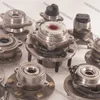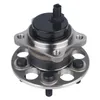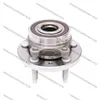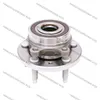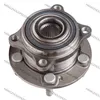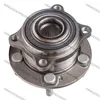A wheel hub unit is a crucial automotive component that connects the wheel to the axle, providing a mounting point for the wheel and bearing assembly. It ensures smooth rotation, supports vehicle weight, and integrates with braking and suspension systems. Modern wheel hub units are often pre-assembled, sealed, and lubricated, making them durable and maintenance-friendly. They are essential for vehicle safety, performance, and efficiency, commonly used in cars, trucks, and other vehicles.
Our wheel hub units are engineered to meet high standards of quality and performance. Below are the detailed parameters in list and table formats for clarity.
| Parameter | Specification | Application |
|---|---|---|
| Outer Diameter | 100 mm to 150 mm | Varies by vehicle model |
| Inner Diameter | 50 mm to 80 mm | Axle-specific sizing |
| Bolt Pattern | 4, 5, or 6 bolts (e.g., 5x114.3 mm) | Matches wheel configuration |
| Speed Rating | Up to 200 km/h | Safe for highway speeds |
| Warranty | 2 years or 50,000 km | Covers defects and wear |
| ISO Certification | ISO 9001:2015 | Quality assurance standard |
Here are some frequently asked questions about wheel hub units, answered in detail to help you understand their functionality and maintenance.
What is the typical lifespan of a wheel hub unit?
The lifespan varies based on driving conditions, but generally, a quality wheel hub unit can last between 100,000 km to 150,000 km. Factors like road quality, vehicle load, and maintenance practices can affect durability. Regular inspections can help extend its life.
How do I know if my wheel hub unit needs replacement?
Common signs include unusual noises (e.g., grinding or humming sounds), vibration in the steering wheel, uneven tire wear, or play in the wheel when lifted. If you experience any of these, it's advisable to have a professional inspection to avoid safety risks.
Can I replace a wheel hub unit myself, or do I need a professional?
While it is possible for experienced DIYers with the right tools, it is recommended to have a professional mechanic handle the replacement. This ensures proper installation, torque specifications, and alignment, which are critical for safety and performance.
Are wheel hub units universal, or vehicle-specific?
Wheel hub units are typically vehicle-specific, designed to match the make, model, and year of the vehicle. It's essential to use the correct part number to ensure compatibility and avoid issues with fitment and function.
What maintenance is required for a wheel hub unit?
Modern wheel hub units are sealed and pre-lubricated, requiring no regular maintenance. However, keeping the area clean and checking for damage during tire changes or brake service can help prevent premature failure. Avoid high-pressure washing directly on the unit to protect seals.
How does a faulty wheel hub unit affect vehicle performance?
A faulty unit can lead to poor handling, increased fuel consumption, excessive tire wear, and even brake failure in severe cases. It can also cause damage to other components like the CV joint or axle, making timely replacement crucial.
What materials are used in high-quality wheel hub units?
Premium units are made from forged steel or aluminum alloys, offering strength and heat resistance. The bearings are often constructed from chrome steel for durability, and seals use nitrile rubber to withstand environmental elements.
Is there a difference between front and rear wheel hub units?
Yes, front wheel hub units often integrate with the braking and steering systems, while rear units may be simpler. They differ in design, load capacity, and mounting based on the vehicle's drivetrain (e.g., front-wheel drive vs. rear-wheel drive).
Can a wheel hub unit be repaired, or must it be replaced entirely?
Most modern wheel hub units are designed as sealed assemblies and cannot be repaired; they must be replaced as a whole unit. Attempting to repair can compromise safety and is not cost-effective compared to replacement.
What certifications should I look for when purchasing a wheel hub unit?
Look for certifications like ISO 9001, which indicates quality manufacturing processes. OEM (Original Equipment Manufacturer) standards or TÜV certification are also good indicators of reliability and safety compliance.
